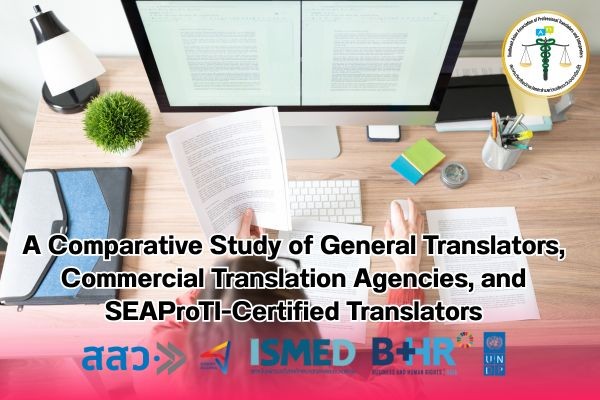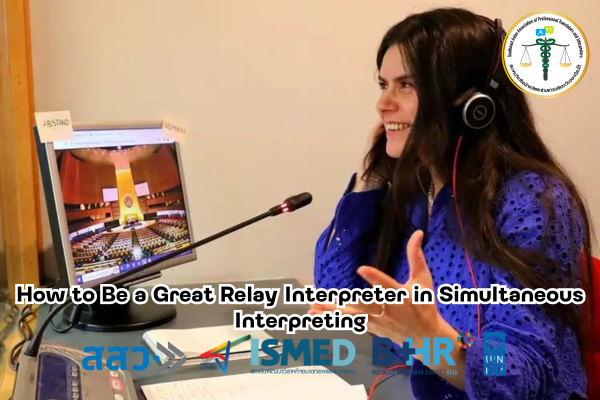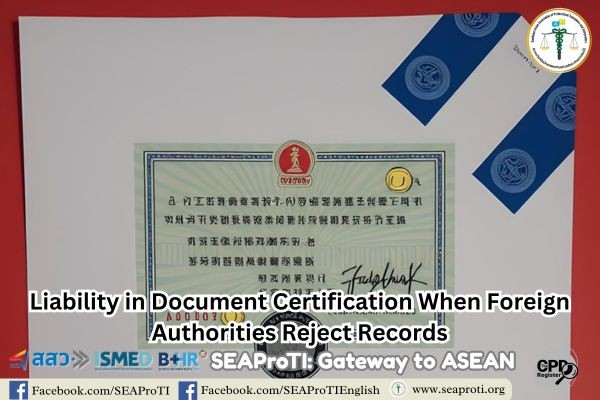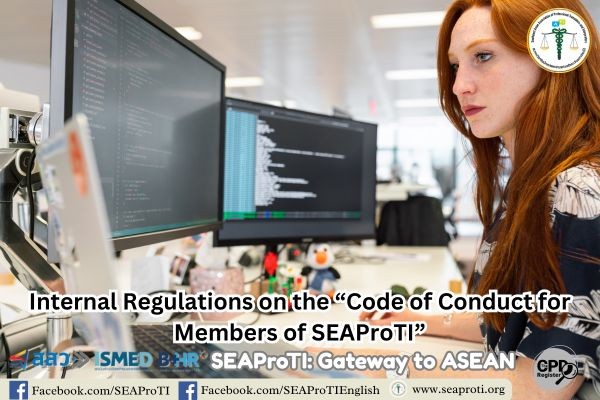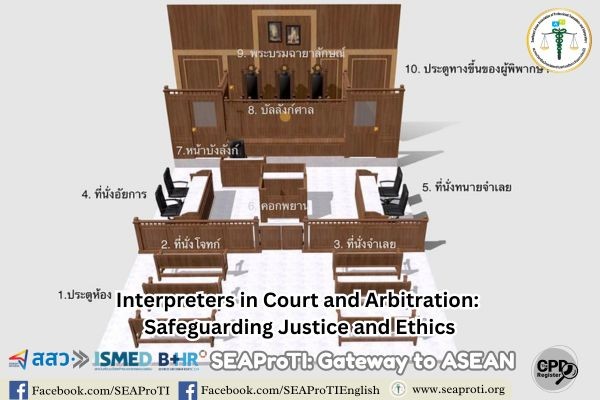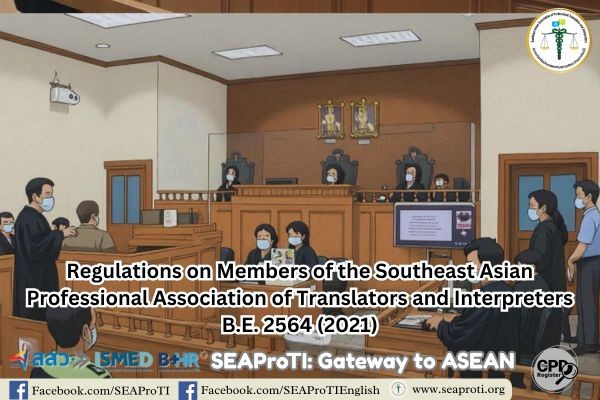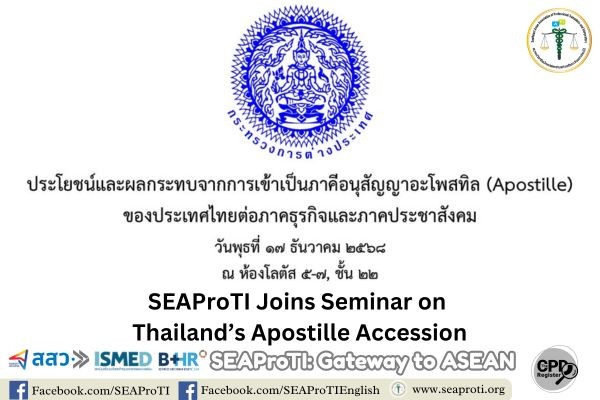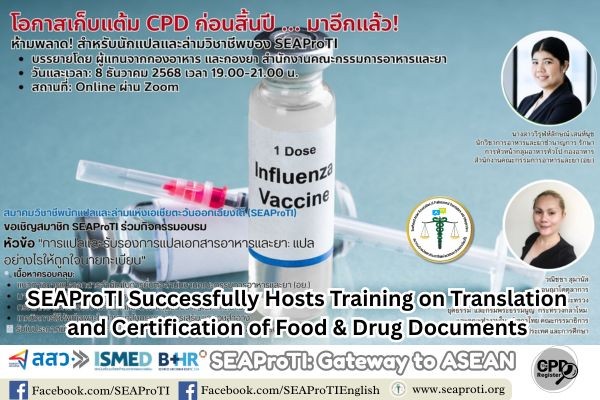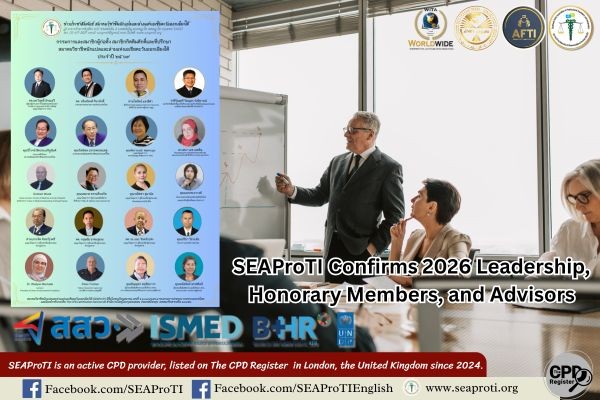Translating Thai Police Daily Records: A Comparative Study of General Translators, Commercial Translation Agencies, and SEAProTI-Certified Translators
19 August 2025
Author: Wanitcha Sumanat, president of the Southeast Asian Association of Professional Translators and Interpreters
Abstract
The translation of Thai police daily records represents a specialized challenge situated at the intersection of law, linguistics, and professional standards. These documents are often used as preliminary evidence in criminal proceedings and therefore require precise legal terminology to preserve both linguistic accuracy and legal validity. This study compares three groups of translators: (1) general freelance translators, (2) commercial translation agencies, and (3) translators certified by the Southeast Asian Association of Professional Translators and Interpreters (SEAProTI). A comparative methodology was applied by analyzing translated samples of police daily records to evaluate terminological accuracy, consistency, and conformity with legal frameworks.
The findings reveal that general translators and commercial agencies often employ literal or colloquial renderings, such as translating “ผู้กล่าวหา” as plaintiff or complainer, which distorts the procedural role under Thai criminal law. In contrast, SEAProTI-certified translators consistently applied internationally recognized legal terminology, such as complainant for “ผู้กล่าวหา” and injured party for “ผู้เสียหาย,” demonstrating a systematic understanding of legal discourse.
The study confirms that translations by certified legal translators maintain the highest professional standards, ensuring that documents are legally credible and admissible for submission to courts, government authorities, and in diplomatic contexts.
Keywords: legal translation, police daily records, Thai law, forensic linguistics, SEAProTI, certified translators
Introduction
Legal translation is among the most complex and high-risk areas of translation, as terminology directly affects the rights, duties, and legal status of individuals (Cao, 2007). One of the documents frequently translated in Thailand is the police daily record (Police Daily Record or General Diary Entry), which documents incidents, complaints, allegations, and case details during the investigative stage. The accuracy of translation is vital since such documents are often used as evidence submitted to courts, government agencies, or foreign embassies (Hale, 2019).
In Thailand, translations of police daily records vary depending on the provider—general freelance translators, commercial translation agencies, or SEAProTI-certified professionals. Each group employs different strategies and terminology choices, which can significantly affect the reliability and credibility of the translated text (Garzone, 2000; SEAProTI, 2023).
This comparative study aims to explore differences in translation methods and terminology choices across the three groups, using Thai police daily records as a case study. The goal is to identify which approach maintains the highest professional and legal standards, and to highlight the importance of having standardized practices in legal translation to prevent misinterpretations that could impact judicial processes (Baker & Saldanha, 2020).
Literature Review
Legal Translation and Linguistic Complexity
Legal translation research emphasizes that the meaning of legal terms cannot always be rendered literally but must reflect the legal status and system of the target jurisdiction (Cao, 2007). For example, the Thai term “ผู้เสียหาย” (phu sia hai, injured party) differs from victim in Anglo-American law, as Thai law allows the injured party to act as a co-plaintiff in criminal proceedings (Thailand, Ministry of Justice, 1997). Thus, mistranslations may undermine legal accuracy (Hale, 2019).
The Role of Translation Standards
Standardization is essential in legal translation to avoid ambiguity and legal disputes (Garzone, 2000). Police records, as preliminary evidence in criminal justice, require particular care, as mistranslations—even minor ones—may affect judicial interpretation abroad (Baker & Saldanha, 2020).
General Translators and Commercial Agencies
Studies by Hale (2019) and professional practice indicate that freelance translators and commercial agencies often favor literal or simplified terms over accurate legal equivalents. Common mistakes include rendering “complainant” as “plaintiff” or “injured party” as “victim”, reflecting the gap between general translation and specialized legal translation.
The Role of Professional Organizations (SEAProTI)
SEAProTI has developed professional standards for legal translators and interpreters in Southeast Asia, requiring certified members to undergo training in legal terminology, adhere to standardized glossaries, and submit work for peer review (SEAProTI, 2023). Samanat (2024) further notes that certified translators’ work is recognized as more reliable and admissible in courts and government agencies, unlike translations from non-certified agencies.
Police Records in Forensic Linguistics
Forensic linguists such as Cotterill (2002) emphasize that interpreting legal documents requires contextual knowledge of institutional discourse. Police records should not be translated without legal awareness, as misrendering “การร้องทุกข์” (lodging a complaint) as “filing a lawsuit” could unintentionally distort legal meaning.
Summary: Police record translation requires both linguistic and legal expertise. While general or agency-based translations risk legal misinterpretation, professional certification through SEAProTI ensures accuracy, consistency, and admissibility.
Comparative Findings
General Translators
- Approach: Literal translation without legal awareness.
- Terminology Issues: “บันทึกประจำวัน” → Daily Note; “ผู้กล่าวหา” → Complainer (Baker & Saldanha, 2020).
- Problems: Lack of consistency; mistranslations undermine legal credibility (Cao, 2007).
SEAProTI-Certified Translators
- Approach: Legal-functional translation using professional glossaries.
- Terminology: “บันทึกประจำวันรับแจ้ง” → General Diary Entry of Complaint; “ผู้กล่าวหา” → Complainant; “ผู้เสียหาย” → Injured Party (SEAProTI, 2023).
- Strengths: Peer-reviewed and certifiable; admissible in courts and embassies (Samanat, 2024).
Commercial Agencies
- Approach: Speed and low cost prioritized over legal precision.
- Terminology Issues: “ผู้กล่าวหา” → Plaintiff; “ผู้เสียหาย” → Victim (Garzone, 2000; Hale, 2019).
- Problems: Non-standardized; translations inadmissible in courts (Thailand, Ministry of Justice, 1997).
Example Comparison
- Original Thai: “วันที่ 15 สิงหาคม 2568 เวลา 14.30 น. ผู้กล่าวหา นายสมชาย เข้ามาแจ้งความว่ารถจักรยานยนต์หาย”
- General Translator: On 15 August 2025 at 14.30 Mr. Somchai came to complain that his motorbike disappeared.
- Commercial Agency: On 15 August 2025 at 14.30 Plaintiff Mr. Somchai reported that his motorcycle was lost.
SEAProTI-Certified Translator: On 15 August 2025, at 14.30 hours, the Complainant, Mr. Somchai, lodged a complaint at the police station stating that his motorcycle had been stolen.
Comparative Table
| Translator Type | Approach | Terminology Examples | Accuracy & Standards |
|---|---|---|---|
| General Translator | Literal, lacks legal awareness | “Daily Note” ❌; “Complainer/Informant” ❌ (Baker & Saldanha, 2020) | Inconsistent; risks legal misinterpretation (Cao, 2007) |
| Commercial Agency | Prioritizes speed, low cost | “Plaintiff/Informant” ❌ for complainant (Garzone, 2000); “Victim” ❌ for injured party (Hale, 2019) | Unreliable; not valid for courts (Thailand, Ministry of Justice, 1997) Must be revised. |
| SEAProTI-Certified | Professional, peer-reviewed | General Diary Entry of Complaint ✅; Complainant ✅; Injured Party ✅ (SEAProTI, 2023; United Nations, 2017) | Highest standard; admissible in courts and embassies (Samanat, 2024) |
References
- Baker, M., & Saldanha, G. (Eds.). (2020). Routledge encyclopedia of translation studies (3rd ed.). Routledge.
- Cao, D. (2007). Translating law. Multilingual Matters.
- Cotterill, J. (Ed.). (2002). Language in the legal process. Palgrave Macmillan.
- Garzone, G. (2000). Legal translation and functionalist approaches: A contradiction in terms? Babel, 46(4), 325–338. https://doi.org/10.1075/babel.46.4.02gar
- Hale, S. B. (2019). The discourse of court interpreting: Discourse practices of the law, the witness, and the interpreter. Routledge.
- Samanat, W. (2024). The certification of legal translation in Thailand: Professional standards and legal frameworks. Journal of Southeast Asian Translation and Interpreting Studies, 2(1), 55–72.
- SEAProTI. (2023). Professional standards for certified translators and interpreters in Southeast Asia. Bangkok: Southeast Asian Association of Professional Translators and Interpreters.
- Thailand, Ministry of Justice. (1997). Ministerial Regulation prescribing rules and procedures for certification of the accuracy of Thai translations, B.E. 2540 (1997). Royal Gazette.
- United Nations. (2017). United Nations editorial manual: Legal terminology in translation. United Nations Publications.
About SEAProTI Certified Translators, Translation Certifiers, and Certified Interpreters
The Southeast Asian Association of Professional Translators and Interpreters (SEAProTI) has formally established criteria for the registration of “Certified Translators,” “Translation Certification Providers,” and “Certified Interpreters.” These provisions are codified under Chapters 9 and 10 of the Royal Gazette, published by the Secretariat of the Cabinet, Office of the Prime Minister of the Kingdom of Thailand, dated 25 July 2024, Vol. 141, Part 66 Ngor, p. 100. The Royal Thai Government Gazette
The Council of State of Thailand has proposed enacting a Royal Decree authorizing registered translators, along with translation certifiers recognized by professional associations or accredited language institutions, to certify translations. (Letter to SEAProTI dated 28 April 2025).
SEAProTI is the first professional association in Thailand and Southeast Asia to establish a certification system for translators, translation certifiers, and interpreters.
Head Office: Baan Ratchakru Building, No. 33, Room 402, Soi Phaholyothin 5, Phaholyothin Road, Phaya Thai Subdistrict, Phaya Thai District, Bangkok 10400, Thailand. Email: hello@seaproti.com Tel.: (+66) 2-114-3128 (Office hours: Monday–Friday, 09:00–17:00)
การแปลบันทึกประจำวันของตำรวจไทย:
การเปรียบเทียบนักแปลทั่วไป ร้านแปลเอกสาร และนักแปลที่ได้รับการรับรอง SEAProTI
19 สิงหาคม 2568
ผู้แต่ง วณิชชา สุมานัส นายกสมาคมวิชาชีพนักแปลและล่ามแห่งเอเชียตะวันออกเฉียงใต้
บทคัดย่อ
การแปลบันทึกประจำวันของตำรวจไทยเป็นความท้าทายเฉพาะทางที่อยู่กึ่งกลางระหว่างกฎหมาย ภาษาศาสตร์ และมาตรฐานวิชาชีพ เอกสารประเภทนี้มักถูกใช้เป็นพยานหลักฐานเบื้องต้นในกระบวนการพิจารณาคดีอาญา จึงจำเป็นต้องใช้คำศัพท์กฎหมายที่ถูกต้องแม่นยำ เพื่อคงไว้ทั้งความถูกต้องทางภาษาและความถูกต้องทางกฎหมาย การศึกษาครั้งนี้มุ่งเปรียบเทียบนักแปลสามกลุ่ม ได้แก่ (1) นักแปลทั่วไป, (2) ร้านแปลเอกสารเชิงพาณิชย์ และ (3) นักแปลที่ได้รับการรับรองจากสมาคมวิชาชีพนักแปลและล่ามแห่งเอเชียตะวันออกเฉียงใต้ (SEAProTI) โดยใช้วิธีการเปรียบเทียบตัวอย่างคำแปลจากบันทึกประจำวันของตำรวจ เพื่อวิเคราะห์ด้านความถูกต้องของคำศัพท์ ความสม่ำเสมอ และความสอดคล้องกับกรอบกฎหมาย
ผลการศึกษาพบว่า นักแปลทั่วไปและร้านแปลเอกสารมักใช้การแปลแบบตรงตัวหรือภาษาพูด เช่น การแปลคำว่า “ผู้กล่าวหา” เป็น plaintiff หรือ complainer ซึ่งบิดเบือนบทบาทในกระบวนการยุติธรรมไทย ในทางตรงกันข้าม นักแปลที่ได้รับการรับรองจาก SEAProTI สามารถเลือกใช้คำศัพท์ที่สอดคล้องกับมาตรฐานกฎหมายระหว่างประเทศได้อย่างถูกต้อง เช่น ใช้ complainant แทน “ผู้กล่าวหา” และ injured party แทน “ผู้เสียหาย” ซึ่งสะท้อนถึงความเข้าใจเชิงกฎหมายอย่างเป็นระบบ
ข้อค้นพบดังกล่าวยืนยันว่าการแปลโดยนักแปลกฎหมายที่ได้รับการรับรองมีมาตรฐานสูงสุด และสามารถสร้างความน่าเชื่อถือและความชอบด้วยกฎหมายของเอกสาร เพื่อการนำไปใช้ในศาล หน่วยงานราชการ และบริบททางการทูตได้อย่างมั่นใจ
คำสำคัญ: การแปลกฎหมาย, บันทึกประจำวันตำรวจ, กฎหมายไทย, นิติภาษาศาสตร์, SEAProTI, นักแปลรับรอง
การแปลเอกสารกฎหมายถือเป็นหนึ่งในงานแปลที่ซับซ้อนและมีความเสี่ยงสูง เนื่องจากถ้อยคำและคำศัพท์ที่ใช้มีผลโดยตรงต่อสิทธิ หน้าที่ และสถานะทางกฎหมายของบุคคล (Cao, 2007) เอกสารหนึ่งที่มักถูกนำมาแปลบ่อยในประเทศไทยคือ บันทึกประจำวันของตำรวจ (Police Daily Record หรือ General Diary Entry) ซึ่งเป็นเอกสารที่บันทึกเหตุการณ์ การร้องทุกข์ การกล่าวหา และรายละเอียดคดีในชั้นสอบสวน ความถูกต้องของการแปลเอกสารดังกล่าวมีความสำคัญอย่างยิ่ง เนื่องจากมักถูกใช้เป็นหลักฐานในการยื่นต่อศาล หน่วยงานราชการ หรือสถานทูตต่างประเทศ (Hale, 2019)
อย่างไรก็ตาม การแปลบันทึกประจำวันของตำรวจในประเทศไทยมีความหลากหลาย ขึ้นอยู่กับผู้ให้บริการแปล ไม่ว่าจะเป็น นักแปลทั่วไป (freelance translators), ร้านแปลเอกสารเชิงพาณิชย์ (translation agencies) หรือ นักแปลที่ได้รับการรับรองจากองค์กรวิชาชีพ เช่น สมาคมวิชาชีพนักแปลและล่ามแห่งเอเชียตะวันออกเฉียงใต้ (SEAProTI) โดยแต่ละกลุ่มมีวิธีการเลือกใช้คำศัพท์และสำนวนที่แตกต่างกัน ซึ่งอาจส่งผลต่อคุณภาพและความน่าเชื่อถือของเอกสาร (Garzone, 2000; SEAProTI, 2023)
การวิจัยเชิงเปรียบเทียบนี้มีวัตถุประสงค์เพื่อสำรวจ ความแตกต่างด้านวิธีการแปลและการใช้ศัพท์ ของผู้แปลทั้งสามกลุ่ม โดยใช้บันทึกประจำวันของตำรวจไทยเป็นกรณีศึกษา และเพื่อชี้ให้เห็นว่า การแปลรูปแบบใดมีมาตรฐานทางวิชาชีพและกฎหมายสูงสุด ตลอดจนสะท้อนให้เห็นถึงความจำเป็นของการมี มาตรฐานกลางในการแปลกฎหมาย เพื่อป้องกันความคลาดเคลื่อนที่อาจส่งผลกระทบต่อกระบวนการยุติธรรม (Baker & Saldanha, 2020)
การแปลกฎหมายและความซับซ้อนทางภาษา
งานวิจัยด้านการแปลกฎหมายเน้นย้ำว่า ความหมายของคำในกฎหมายไม่สามารถแปลตรงตัวได้เสมอไป แต่ต้องคำนึงถึง สถานะทางกฎหมายและระบบกฎหมายของแต่ละประเทศ (Cao, 2007) ตัวอย่างเช่น คำว่า “ผู้เสียหาย” ในกฎหมายไทยมีนัยยะที่แตกต่างจาก victim ในกฎหมาย Anglo-American เพราะผู้เสียหายในไทยอาจเข้าร่วมเป็นโจทก์ร่วมในคดีอาญาได้ (Thailand, Ministry of Justice, 1997) ดังนั้น การเลือกใช้คำที่ไม่ถูกต้องอาจทำให้เอกสารแปลสูญเสียความถูกต้องเชิงกฎหมาย (Hale, 2019)
บทบาทของมาตรฐานการแปล
การมี มาตรฐานกลาง (standardization) เป็นสิ่งจำเป็นสำหรับงานแปลกฎหมายเพื่อป้องกันความกำกวมและความขัดแย้งทางกฎหมาย (Garzone, 2000) โดยเฉพาะในงานที่เกี่ยวข้องกับ บันทึกของตำรวจ (police records) ซึ่งถือเป็นพยานหลักฐานเบื้องต้นในกระบวนการยุติธรรม หากแปลผิดเพียงเล็กน้อยอาจส่งผลต่อการพิจารณาคดีหรือการตีความของต่างประเทศ (Baker & Saldanha, 2020).
นักแปลทั่วไปและร้านแปลเอกสาร
จากการศึกษาของ Hale (2019) และประสบการณ์วิชาชีพ พบว่านักแปลทั่วไปหรือร้านแปลเอกสารมักใช้การแปลตรงตัวและเลือกคำที่ง่ายต่อความเข้าใจ แต่ไม่ถูกต้องในเชิงกฎหมาย เช่น ใช้ plaintiff แทน complainant หรือ victim แทน injured party ซึ่งสะท้อนถึงความแตกต่างระหว่างการแปลทั่วไปกับการแปลเฉพาะทาง (specialized translation)
บทบาทขององค์กรวิชาชีพ (SEAProTI)
SEAProTI ได้เสนอกรอบมาตรฐานการแปลและการรับรองเอกสารทางกฎหมายในเอเชียตะวันออกเฉียงใต้ โดยยืนยันว่า นักแปลที่ได้รับการรับรอง ต้องผ่านการอบรมด้านภาษากฎหมาย การใช้ศัพท์มาตรฐาน และมีระบบ peer review (SEAProTI, 2023) งานของ Samanat (2024) ยังชี้ให้เห็นว่าการแปลโดยนักแปลที่ได้รับการรับรองมีความน่าเชื่อถือสูงกว่าและสามารถใช้ในศาลหรือหน่วยงานราชการได้จริง ต่างจากการแปลโดยร้านแปลทั่วไปซึ่งไม่มีฐานะทางกฎหมาย
การแปลบันทึกประจำวันของตำรวจในเชิงนิติภาษาศาสตร์
นักนิติภาษาศาสตร์ (forensic linguists) เช่น Cotterill (2002) ชี้ว่าการตีความถ้อยคำในเอกสารกฎหมายต้องอาศัยความเข้าใจเชิงบริบทของกฎหมายและการใช้ภาษาในเชิงสถาบัน (institutional discourse) เอกสารอย่างบันทึกประจำวันของตำรวจจึงไม่ควรถูกแปลโดยขาดความรู้ทางกฎหมาย เพราะอาจทำให้ความหมายเปลี่ยนจาก “การร้องทุกข์” ไปเป็น “การฟ้องคดี” โดยไม่ตั้งใจ
จากวรรณกรรมที่ทบทวน พบว่า การแปลบันทึกประจำวันตำรวจเป็นการแปลที่ต้องอาศัยมาตรฐานทางกฎหมายและภาษาศาสตร์ร่วมกัน หากใช้การแปลทั่วไปหรือร้านแปลที่ขาดมาตรฐาน อาจนำไปสู่ความคลาดเคลื่อนเชิงกฎหมาย ในทางตรงกันข้าม การแปลที่ยึดตามมาตรฐานองค์กรวิชาชีพ เช่น SEAProTI จะช่วยให้ได้เอกสารที่มีความถูกต้องสูง และสามารถใช้ได้จริงในกระบวนการยุติธรรม
วิธีการและแนวโน้มการใช้ศัพท์ของแต่ละกลุ่ม
นักแปลทั่วไป (Freelance Translators without specialization)
- ลักษณะการแปล: มักใช้การแปลตรงตัวจากคำไทยเป็นอังกฤษ โดยไม่คำนึงถึงศัพท์กฎหมายหรือสำนวนราชการ
- การใช้ศัพท์: อาจแปล “ผู้ต้องหา” เป็น suspect ตลอด แม้ในบางกรณีควรใช้ accused หรือ defendant ตามขั้นตอนกฎหมาย
- ปัญหา: ขาด consistency และอาจเกิด mistranslation ที่ทำให้เอกสารขาดความน่าเชื่อถือทางกฎหมาย
ตัวอย่าง:
- “บันทึกประจำวัน” → “Daily Note” (ผิดบริบท)
- “ผู้กล่าวหา” → “Complainer” (ไม่เป็นมาตรฐาน)
นักแปล SEAProTI Certified
- ลักษณะการแปล: ยึดหลักมาตรฐานการแปลกฎหมาย (legal translation) และหลักฐานทางนิติวิทยาศาสตร์ทางภาษา
- การใช้ศัพท์: เลือกใช้คำตาม glossary มาตรฐาน ที่สมาคม SEAProTI จัดทำ เช่น
- “บันทึกประจำวัน” → Daily Record of Police Occurrence หรือ Daily Police Report (General Diary)
- “ผู้กล่าวหา” → Complainant
- “ผู้ต้องหา” → Accused / Suspect (เลือกตามบริบทในคดี)
จุดเด่น: มีการตรวจสอบ (peer review) และรับรองความถูกต้อง (certification) ทำให้ใช้ในศาลหรือสถานทูตได้
ตัวอย่าง:
- “บันทึกประจำวันรับแจ้ง” → General Diary Entry of Complaint
- “ผู้เสียหาย” → Injured Party (ไม่ใช่ victim เสมอไป ขึ้นกับสถานะในคดี)
ร้านแปลเอกสาร (Translation Agencies/Shops)
- ลักษณะการแปล: เน้นความรวดเร็วและราคาถูกมากกว่าความถูกต้องเชิงกฎหมาย
- การใช้ศัพท์: มัก copy สำนวนกันมา เช่น
- “บันทึกประจำวัน” → “Diary” หรือ “Daily Report” แบบสั้น ๆ
- “ผู้กล่าวหา” → “Plaintiff” แม้จะยังไม่เข้าสู่ศาล (ผิดขั้นตอนกฎหมาย)
- ปัญหา: ขาดมาตรฐาน มักไม่สอดคล้องกับคำศัพท์ทางกฎหมายสากล
ตัวอย่าง:
“ผู้เสียหายได้เข้าแจ้งความ” → The victim filed a lawsuit (ซึ่งจริง ๆ ต้องเป็น lodged a complaint at the police station)
การแปลที่ถูกต้องและมีมาตรฐานกว่า
มาตรฐานสูงสุด: นักแปลที่ได้รับการรับรองจาก SEAProTI หรือองค์กรวิชาชีพ เนื่องจากมี glossary, peer review, และการอบรมเฉพาะด้านกฎหมาย
การใช้งานจริง: ถ้าเป็นงานยื่นต่อศาล สถานทูต หรืองานราชการ ต้องใช้ Certified Translation ซึ่งนักแปลทั่วไปและร้านแปลไม่สามารถรับรองได้ตามกฎหมาย
ตัวอย่างเปรียบเทียบ
- ประโยค: “วันที่ 15 สิงหาคม 2568 เวลา 14.30 น. ผู้กล่าวหา นายสมชาย เข้ามาแจ้งความว่ารถจักรยานยนต์หาย”
นักแปลทั่วไป: On 15 August 2025 at 14.30 Mr. Somchai came to complain that his motorbike disappeared. (ไม่เป็นทางการ, ใช้คำว่า disappeared)
ร้านแปล: On 15 August 2025 at 14.30 Plaintiff Mr. Somchai reported that his motorcycle was lost. (ใช้ plaintiff ผิดบริบท เพราะยังไม่เข้าสู่ชั้นศาล)
นักแปล SEAProTI: On 15 August 2025, at 14.30 hours, the Complainant, Mr. Somchai, lodged a complaint at the police station stating that his motorcycle had been stolen. (เป็นทางการ ใช้ lodged a complaint และ stolen สอดคล้องกับศัพท์กฎหมาย)
สรุป
- นักแปลทั่วไป = เข้าใจง่าย แต่เสี่ยงผิดบริบท
- ร้านแปล = รวดเร็ว ราคาถูก แต่ไม่ถูกต้องตามกฎหมาย
- นักแปล SEAProTI = มีมาตรฐานสูงสุด ใช้คำศัพท์กฎหมายถูกต้อง และรับรองได้
ดังนั้น หากเป็นงานสำคัญ เช่น ใช้ในศาล สถานทูต หรือเอกสารราชการ การแปลโดยนักแปล SEAProTI หรือผู้ได้รับการรับรอง คือมาตรฐานที่ถูกต้องที่สุด
ตารางเปรียบเทียบวิธีการแปลบันทึกประจำวันตำรวจไทย
| ประเภทผู้แปล | ลักษณะการแปล | การใช้ศัพท์/ตัวอย่าง | ความถูกต้อง & มาตรฐาน |
|---|---|---|---|
| นักแปลทั่วไป | มักแปลตรงตัว ไม่คำนึงถึงบริบททางกฎหมาย | – “บันทึกประจำวัน” → Daily Note ❌ – “ผู้กล่าวหา/ผู้แจ้ง” → Complainer ❌ (Baker & Saldanha, 2020) | ไม่เป็นมาตรฐาน ขาด consistency เสี่ยงต่อการตีความผิด (Cao, 2007) |
| ร้านแปลเอกสาร | เน้นความเร็ว ราคาถูก ใช้ศัพท์ซ้ำตามวงการ | – “ผู้กล่าวหา/ผู้แจ้ง” → Plaintiff/Informant ❌ แม้ยังไม่เข้าสู่ศาล (Garzone, 2000) – “ผู้เสียหาย” → Victim แทนที่จะใช้ Injured Party (Hale, 2019) | คุณภาพไม่เสถียร ใช้ในราชการ/ศาลไม่ได้ (Thailand, Ministry of Justice, 1997) จะต้องแก้ไขเพิ่มเติม |
| นักแปล SEAProTI | อิงมาตรฐานวิชาชีพ ตรวจสอบ peer review และรับรองได้ | – “บันทึกประจำวันรับแจ้ง” → General Diary Entry of Complaint ✅ – “ผู้กล่าวหา” → Complainant ✅ – “ผู้เสียหาย” → Injured Party ✅ (SEAProTI, 2023; United Nations, 2017) | ถูกต้องตามมาตรฐาน ใช้ในศาล/สถานทูต/ราชการได้ (Samanat, 2024) |
อ้างอิง:
- Baker, M., & Saldanha, G. (Eds.). (2020). Routledge encyclopedia of translation studies (3rd ed.). Routledge.
- Cao, D. (2007). Translating law. Multilingual Matters.
- Garzone, G. (2000). Legal translation and functionalist approaches: A contradiction in terms? Babel, 46(4), 325–338. https://doi.org/10.1075/babel.46.4.02gar
- Hale, S. B. (2019). The discourse of court interpreting: Discourse practices of the law, the witness, and the interpreter. Routledge.
- Samanat, W. (2024). The certification of legal translation in Thailand: Professional standards and legal frameworks. Journal of Southeast Asian Translation and Interpreting Studies, 2(1), 55–72.
- SEAProTI. (2023). Professional standards for certified translators and interpreters in Southeast Asia. Bangkok: Southeast Asian Association of Professional Translators and Interpreters.
- Thailand, Ministry of Justice. (1997). Ministerial Regulation prescribing rules and procedures for certification of the accuracy of Thai translations, B.E. 2540 (1997). Royal Gazette.
- United Nations. (2017). United Nations editorial manual: Legal terminology in translation. New York: United Nations Publications.
เกี่ยวกับนักแปลรับรอง ผู้รับรองการแปล และล่ามรับรองของสมาคมวิชาชีพนักแปลและล่ามแห่งเอเชียตะวันออกเฉียงใต้
* สมาคมวิชาชีพนักแปลและล่ามแห่งเอเชียตะวันออกเฉียงใต้ (SEAProTI) ได้ประกาศหลักเกณฑ์และคุณสมบัติผู้ที่ขึ้นทะเบียนเป็น “นักแปลรับรอง (Certified Translators) และผู้รับรองการแปล (Translation Certification Providers) และล่ามรับรอง (Certified Interpreters)” ของสมาคม หมวดที่ 9 และหมวดที่ 10 ในราชกิจจานุเบกษา ของสำนักเลขาธิการคณะรัฐมนตรี ในสำนักนายกรัฐมนตรี แห่งราชอาณาจักรไทย ลงวันที่ 25 ก.ค. 2567 เล่มที่ 141 ตอนที่ 66 ง หน้า 100 อ่านฉบับเต็มได้ที่: นักแปลรับรอง ผู้รับรองการแปล และล่ามรับรอง
** สำนักคณะกรรมการกฤษฎีกาเสนอให้ตราเป็นพระราชกฤษฎีกา โดยกำหนดให้นักแปลที่ขึ้นทะเบียน รวมถึงผู้รับรองการแปลจากสมาคมวิชาชีพหรือสถาบันสอนภาษาที่มีการอบรมและขึ้นทะเบียน สามารถรับรองคำแปลได้ (จดหมายถึงสมาคม SEAProTI ลงวันที่ 28 เม.ย. 2568)
*** สมาคมวิชาชีพนักแปลและล่ามแห่งเอเชียตะวันออกเฉียงใต้ เป็นสมาคมวิชาชีพแห่งแรกในประเทศไทยและภูมิภาคเอเชียตะวันออกเฉียงใต้ที่มีระบบรับรองนักแปลรับรอง ผู้รับรองการแปล และล่ามรับรอง
สำนักงานใหญ่: อาคารบ้านราชครู เลขที่ 33 ห้อง 402 ซอยพหลโยธิน 5 ถนนพหลโยธิน แขวงพญาไท เขตพญาไท กรุงเทพมหานคร 10400 อีเมล: hello@seaproti.com โทรศัพท์: (+66) 2-114-3128 (เวลาทำการ: วันจันทร์–วันศุกร์ เวลา 9.00–17.00 น.)


